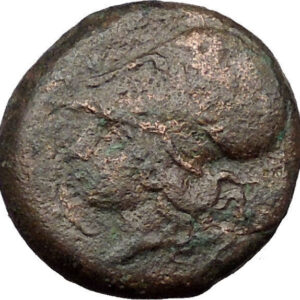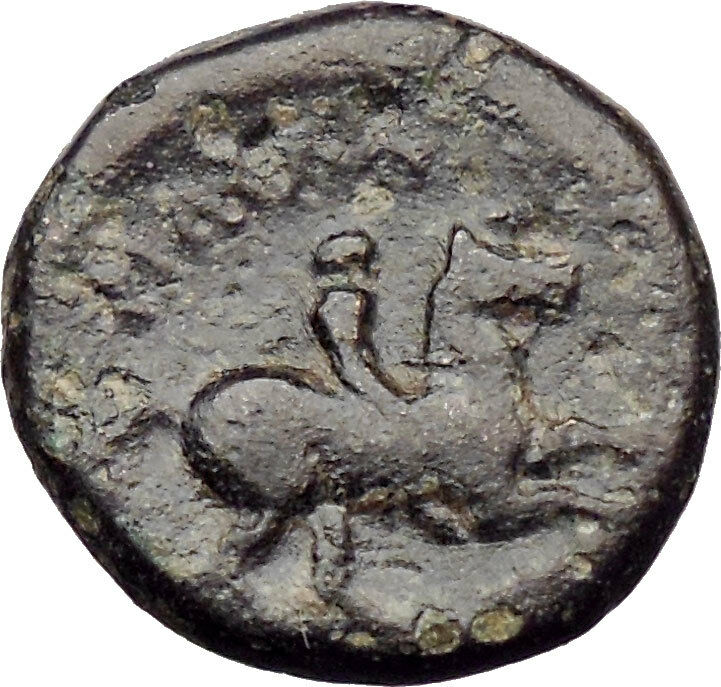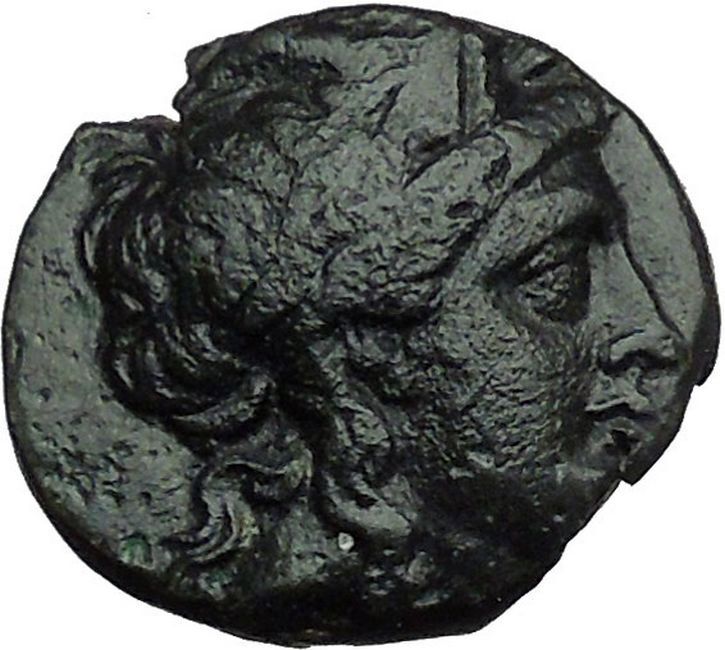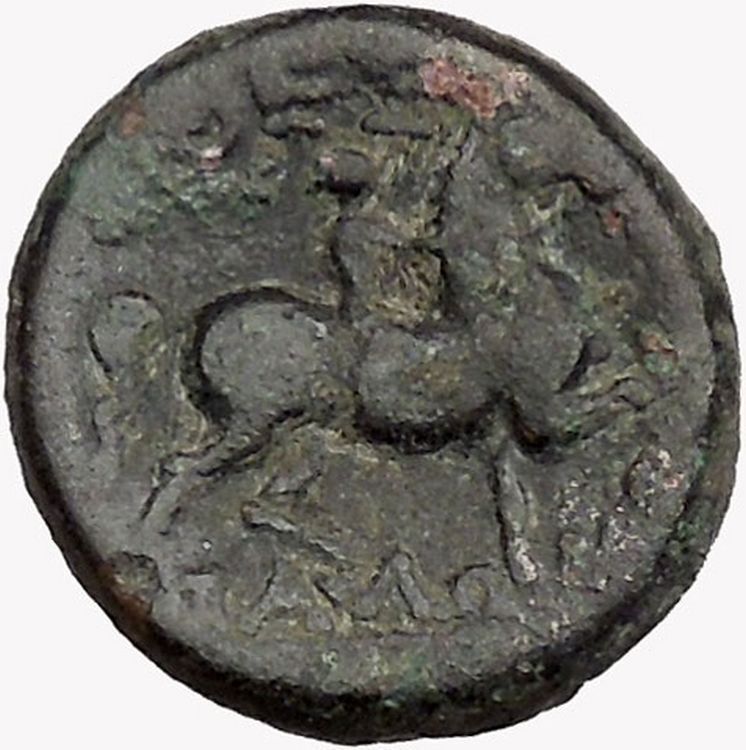|
Greek island of Rhodes off Caria
Bronze 9mm (0.77 grams) Struck 394-304 B.C.
Reference: SNGCop 750; SNG von Aulock 2797
Diademed head of the nymph Rhodos right.
P-O, rose with bud right.
The large and important island of Rhodos, off the south-west
coast of Asia Minor, produced a considerable coinage in the archaic period
from its three major cities, Ialysos, Kamiros and Lindos. After the Persian wars
no further coinage was issued on the island until the foundation of the new
federal capital circa 408 B.C. This splendid city, situated on the northern
promontory only 12 miles from the mainland, was given the same name as the
island. It quickly achieved great prosperity and eventually became one of the
principal trading centers of the ancient world. In the third century Rhodos
exercised much political influence in the eastern Mediterranean, through the
strength of its fleet. But in 167 B.C. the Romans declared Delos a free port,
and the Rhodians, their prosperity now greatly diminished, sank into comparative
obscurity.
You are bidding on the exact item pictured,
provided with a Certificate of Authenticity and Lifetime Guarantee of
Authenticity.
A nymph in
Greek mythology
is a female minor nature deity
typically associated with a particular location or landform. Different from
gods, nymphs are generally regarded as divine spirits who animate nature, and
are usually depicted as beautiful, young
nubile
maidens who love to dance and sing;
their amorous freedom sets them apart from the restricted and chaste wives and
daughters of the Greek
polis
. They are believed to dwell in
mountains and
groves
, by springs and rivers, and also in
trees and in valleys and cool
grottoes
. Although they would never die of old
age nor illness, and could give birth to fully immortal children if mated to a
god, they themselves were not necessarily immortal, and could be beholden to
death in various forms. Charybdis and Scylla were once nymphs.
Other nymphs, always in the shape of young maidens, were part of the
a title=”Retinue” href=”https://en.wikipedia.org/wiki/Retinue”>
retinue of a god, such as
Dionysus
,
Hermes
, or
Pan
, or a goddess, generally the huntress
Artemis
. Nymphs were the frequent target of
satyrs
. They are frequently associated with the
superior divinities: the huntress
Artemis
; the prophetic
Apollo
; the reveller and god of
wine,
Dionysus
; and rustic gods such as Pan and
Hermes.
Etymology
Nymphs are personifications of the creative and fostering activities of
nature, most often identified with the life-giving outflow of springs: as
Walter Burkert
(Burkert 1985:III.3.3) remarks,
“The idea that rivers are gods and springs divine nymphs is deeply rooted not
only in poetry but in belief and ritual; the worship of these deities is limited
only by the fact that they are inseparably identified with a specific locality.”
The
Greek
word
νύμφη has “bride” and “veiled” among its meanings: hence a marriageable
young woman. Other readers refer the word (and also
Latin
nubere and
German
Knospe) to a root expressing the
idea of “swelling” (according to
Hesychius
, one of the meanings of
νύμφη is “rose-bud”).
Rhodes is a
Greek
island
approximately 18 kilometres (11 mi) southwest of
Turkey
in
eastern Aegean Sea
. It is the largest of the
Dodecanese
islands in terms of both land area and population, with a population of 117,007[1]
of which 53,709 resided in the
homonymous
capital
city of the island.
Historically, Rhodes was famous worldwide for the
Colossus of Rhodes
, one of the
Seven Wonders of the World
. The medieval Old Town of the City of Rhodes has
been declared a
World Heritage Site
. Today Rhodes is a tourist destination.
//
Geography
The island of Rhodes is shaped like a
spearhead
,
79.7 km (49.5 mi) long and 38 km (24 mi) wide, with a total area of
approximately 1,400 square kilometres (541 sq mi) and a coastline of
approximately 220 km (137 mi). The
city of Rhodes
is located at the northern tip of the island, as well as the
site of the ancient and modern commercial
harbours
. The main air gateway (Diagoras
International Airport, IATA code: RHO) is located 14 km (9 mi) to the
southwest of the city in
Paradisi
. The road network radiates from the city along the east and west
coasts.
In terms of
flora
and
fauna
, Rhodes is closer to
Asia Minor
than to the rest of Greece. The interior of the island is
mountainous, sparsely inhabited and covered with forests of
pine (Pinus
brutia) and
cypress
(Cupressus sempervirens). The island is home to the Rhodian
deer. In
Petaludes
Valley (Greek for “Valley of the Butterflies”), large numbers of
tiger moths
gather during the summer months. Mount Attavyros, at 1,216 metres
(3,990 ft), is the island’s highest point of elevation. While the shores are
rocky, the island has arable strips of land where
citrus
fruit,
wine grapes,
vegetables, olives and other crops are grown.
Outside of the city of Rhodes, the island is dotted with small villages and
beach resorts, among them
Faliraki
,
Lindos
,
Kremasti
,
Haraki
,
Pefkos
,
Archangelos
, Afantou
, Koskinou
,
Embona
(Attavyros),
Paradisi
, and
Trianta
(Ialysos). Tourism is the island’s primary source of income.
Earthquakes
Rhodes has experienced severe
earthquakes
.
Notable are the
226 BC earthquake
that destroyed the
Colossus of Rhodes
; the one on 3 May 1481 which destroyed much of the city
of Rhodes;[2]
and the one on 26 June 1926.[3]
15 July 2008, Rhodes was struck by a
6.3 magnitude earthquake
causing minor damage to a few old buildings. One
woman lost her life when she fell down stairs while trying to flee her home.[4]
History
Ancient times
Further information:
Rhodes (city)
The island was inhabited in the
Neolithic
period, although little remains of this culture. In the 16th century BC the
Minoans
came to Rhodes. Later Greek mythology recalled a Rhodian race called
the Telchines
,
and associated the island of Rhodes with
Danaus
; it was
sometimes nicknamed Telchinis. In the 15th century BC,
Mycenaean Greeks
invaded. After the
Bronze Age collapse
the first renewed outside contacts are with
Cyprus
.[5]In
the 8th century BC the island’s settlements started to form, with the coming of
the Dorians
,
who built the three important cities of Lindos,
Ialyssos
and
Kameiros
,
which together with Kos
,
Cnidus
and
Halicarnassus
(on the mainland) made up the so-called
Dorian Hexapolis
.
Before archaeology, myth stood in for blanks in the historical record/ In
Pindar
‘s ode,
the island was said to be born of the union of
Helios
the sun
god and the nymph
Rhode
, and the cities were named for their three sons. The rhoda is a
pink hibiscus
native to the island.
Diodorus Siculus
added that
Actis
, one of the
sons of Helios and Rhode, travelled to
Egypt
. He built
the city of
Heliopolis
and taught the Egyptians the science of
astrology
.[6]
In the second half of the eighth century the sanctuary of Athena received
votive gifts that are markers for cultural contacts: small ivories from the Near
East and bronze objects from Syria. At
Kameiros
on
the northwest coast, a former Bronze Age site, where the temple was founded in
the eighth century, there is another notable contemporaneous sequence of carved
ivory figurines. Phoenician presence on the island at
Ialysos
is
attested in traditions recorded much later by Rhodian historians.
The Persians invaded and overran the island, but were in turn defeated by
forces from Athens
in 478 BC. The cities joined the
Athenian League
. When the
Peloponnesian War
broke out in 431 BC, Rhodes remained largely neutral,
although it remained a member of the League. The war lasted until 404 BC, but by
this time Rhodes had withdrawn entirely from the conflict and decided to go her
own way.
In 408 BC the cities united to form one territory. They built the city of
Rhodes, a new capital on the northern end of the island. Its regular plan was
superintended by the Athenian architect
Hippodamus
. The Peloponnesian War had so weakened the entire Greek culture
that it lay open to invasion. In 357 BC the island was conquered by the king
Mausolus
of Caria
, then it
fell to the Persians in 340 BC. Their rule was also short. To the great relief
of its citizens, Rhodes became a part of the growing empire of
Alexander the Great
in 332 BC, after he defeated the Persians.
Following the death of Alexander his generals vied for control of the
kingdom. Three:
Ptolemy
,
Seleucus
, and
Antigonus
, succeeded in dividing the kingdom among themselves. Rhodes formed
strong commercial and cultural ties with the Ptolemies in
Alexandria
,
and together formed the Rhodo-Egyptian alliance that controlled trade throughout
the Aegean in the 3rd century BC. The city developed into a maritime, commercial
and cultural center; its coins circulated nearly everywhere in the
Mediterranean. Its famous schools of philosophy, science, literature and
rhetoric
shared masters with Alexandria: the Athenian rhetorician
Aeschines
,
who formed a school at Rhodes;
Apollonius of Rhodes
; the observations and works of the astronomers
Hipparchus
and Geminus
,
the rhetorician
Dionysios Trax
. Its school of sculptors developed a rich, dramatic style
that can be characterized as “Hellenistic
Baroque
“.
In 305 BC, Antigonus directed his son,
Demetrius
, to besiege Rhodes in an attempt to break its alliance with Egypt.
Demetrius created huge
siege engines
, including a 180 ft (55 m)
battering ram
and a
siege
tower
named
Helepolis
that weighed 360,000 pounds (163,293 kg). Despite this engagement, in 304 BC
after only one year, he relented and signed a peace agreement, leaving behind a
huge store of military equipment. The Rhodians sold the equipment and used the
money to erect a statue of their sun god,
Helios
, the
statue since called the
Colossus of Rhodes
.
In 164 BC, Rhodes signed a treaty with
Rome
.
It became an educational center for Roman noble families, and was especially
noted for its teachers of rhetoric, such as
Hermagoras
and the author of the
Rhetorica ad Herennium
. At first the state was an important ally of Rome
and enjoyed numerous privileges, but these were later lost in various
machinations of Roman politics.
Cassius
eventually invaded the island and sacked the city.
In the first century AD, the Emperor
Tiberius
spent a brief term of exile on Rhodes.
Saint Paul
brought
Christianity
to people on the island.[7]
Rhodes reached her zenith in the third century. In 395, the long
Byzantine Empire
-period began for Rhodes, when the eastern half of the Roman
empire became gradually more Greek.
Rhodes was occupied by the
Muslim
forces
of Muawiyah
I
in 672. In circa
1090 it was occupied by the Muslim forces of the
Seljuk Turks
, not long after the
Battle of Manzikert
.[8]
Rhodes was recaptured by the
Byzantine
Emperor
Alexius I Comnenus
during the
First
Crusade
.
Medieval period
Further information:
Siege of Rhodes (1480)
,
Siege of Rhodes (1522)
In 1309 the Byzantine era came to an end when the island was occupied by
forces of the
Knights Hospitaller
. Under the rule of the newly named “Knights of Rhodes”,
the city was rebuilt into a model of the European medieval ideal. Many of the
city’s famous monuments, including the
Palace of the Grand Master
, were built during this period.
The strong walls which the Knights had built withstood the attacks of the
Sultan
of
Egypt
in 1444,
and of Mehmed
II
in 1480. Ultimately, however, Rhodes fell to the large army of
Suleiman the Magnificent
in December 1522, long after the rest of the
Byzantine empire had been lost. The few surviving Knights were permitted to
retire to the
Kingdom of Sicily
. The Knights would later move their base of operations to
Malta. The island was thereafter a possession of the
Ottoman Empire
for nearly four centuries.
Modern history
The island was populated by ethnic groups from the surrounding nations,
including Jews. Under the Ottoman Empire rule, they generally did fairly well,
but discrimination and bigotry occasionally arose.[citation
needed] In February 1840, the Jews of Rhodes were falsely accused
of ritually murdering a Christian boy. This became known as the
Rhodes blood libel
.
In 1912, Italy seized Rhodes from the Turks. The island’s population thus
bypassed many of the events associated with the
“exchange of the minorities”
between Greece and
Turkey
. Due to
the
Treaty of Lausanne
, the island, together with the
Dodecanese
,
was officially assigned to Italy. It became the core of their possession of the
Isole Italiane dell’Egeo.
Following the
Italian Armistice of 8 September 1943
, the British attempted to get the
Italian garrison on Rhodes to change sides. This was anticipated by the
German
Army
, which succeeded in occupying the island. In great measure, the German
occupation caused the British failure in the subsequent
Dodecanese Campaign
.
On 19 July 1944 the
Gestapo
rounded up the island’s nearly 2000
Jewish
inhabitants, to send them to extermination camps. About 160 of the
island’s more than 600 Greek Jews survived. The
Turkish
Consul
Selahattin Ülkümen
succeeded, at considerable risk to himself and his
family, in saving 42 Jewish families, about 200 persons in total, who had
Turkish citizenship or were family members of Turkish citizens.
In 1948, together with the other islands of the
Dodecanese
,
Rhodes was united with Greece.
In 1949, Rhodes was the venue for negotiations between
Israel
and
Egypt
,
Jordan
,
Lebanon
, and
Syria
, concluding
with the
1949 Armistice Agreements
.
Archaeology
In
ancient
times, Rhodes was home to one of the Seven Wonders of the World—the
Colossus of Rhodes
. This giant bronze statue was documented as once standing
at the harbour. It was completed in 280 BC but was destroyed in an
earthquake
in 224 BC. No trace of the statue remains today.
Historical
sites on the island of Rhodes include the
Acropolis of Lindos
, the
Acropolis of Rhodes
, the
Temple of Apollo
, ancient
Ialysos
,
ancient
Kamiros
, the
Governor’s Palace
,
Rhodes Old Town
(walled medieval city), the
Palace of the Grand Masters
,
Kahal Shalom Synagogue
in the
Jewish
Quarter
, the
Archeological Museum
, the ruins of the
castle of Monolithos
, the
castle of Kritinia
and
St. Catherine Hospice
.
|








